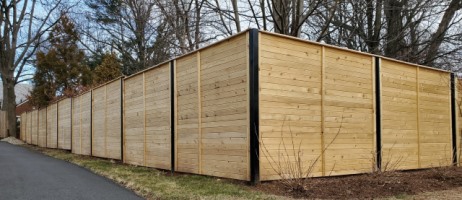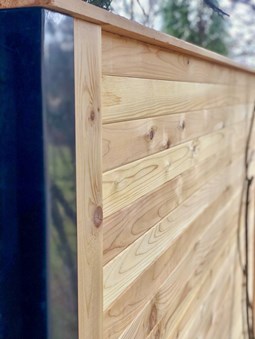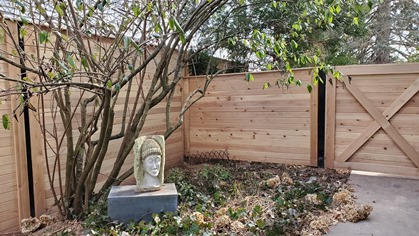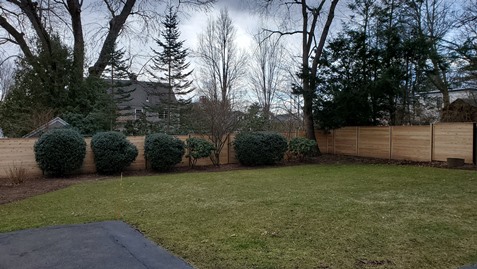

“When I begin to engage a customer, my first step is to be a good listener,” Conover explained. “Matt was a very particular customer in every regard. Privacy was a priority. He was also looking for durability and longevity.”
A cedar fence was the optimal choice — especially with Conover’s modern concept of installing a red cedar horizontal tongue and groove board panel on black metal posts.
“The character and presence that a cedar fence creates is incomparable,” Conover said. “The contrast achieved when you effectively mix materials, in this case wood and steel, is paramount. Strength and beauty through balance are all apparent.”
Conover tends to favor red cedar over white. He appreciates its variation, depth and dimension, which looks particularly distinguished as it ages — as Conover describes it, “A silver fox of a fence, like Paul Newman in wood form.”
Stoner was on board with Conover’s design. So much so, in fact, that he reached out to his neighbor, Ruth Cohen. The two share a fence line that borders each of their back yards, and Stoner wanted Cohen to have a say in the new look. Stoner is very detail oriented. Cohen is artistic and design savvy. Conover is all of the above, and the two neighbors were happy to give Conover full creative control. Then, the real fun began.
 For this project, Conover enlisted Insterstate Wholesale Fence out of Long Island, NY for the custom cedar panels and gates. “Interstate makes a beautiful wood product, consistently,” says Conover. “I use them for all our wood jobs, so there was no question about where I would source the horizontal panels.”
For this project, Conover enlisted Insterstate Wholesale Fence out of Long Island, NY for the custom cedar panels and gates. “Interstate makes a beautiful wood product, consistently,” says Conover. “I use them for all our wood jobs, so there was no question about where I would source the horizontal panels.”
Conover also reached out to Marshall Sampietro at Master Halco for their PostMaster posts, which were a good fit for the unusual design he had in mind.
“I was interested in both the function and durability of the steel, but also the esthetic,” Conover said.
Although Conover’s design plans for their product were not necessarily what Master Halco foresaw (PostMaster line-posts are intended to be concealed by a cover board) they, like Conover, were up to the challenge of a new design angle.
Conover appreciates the value of building close relationships. He refers to his suppliers not as vendors (a common designation in the industry), but rather as “collaborators,” which aptly expresses his commitment to the companies and people with whom he chooses to partner.
“I have worked with Interstate Fence and Master Halco for years,” he explained. “Fence, like anything else, is all about relationships — communication, responsiveness, and quality of product.”
Conover also credits his business partner, Chris Greaves, for his integral role in the success of Hartford Fence Company.
“I have the opportunity to work with my favorite collaborator every day,” he said. “He has a tremendous amount of experience in the fence industry, and he pushes me to keep growing and innovating.”
With his collaborators lined up, the real core of the project took shape: pairing and contrast.
 PostMaster gate posts are offered in a black option, in a 4” square diameter. Conover used the gateposts not only for the gates, but also for every termination. He wanted each corner and end to present with size. To complete the uniform look, Conover sent the Master Halco product to Plastonics, a local powder-coating outfit, and had them coated in a semi-gloss black.
PostMaster gate posts are offered in a black option, in a 4” square diameter. Conover used the gateposts not only for the gates, but also for every termination. He wanted each corner and end to present with size. To complete the uniform look, Conover sent the Master Halco product to Plastonics, a local powder-coating outfit, and had them coated in a semi-gloss black.
It may seem out of the ordinary in the fence industry to see materials coming from two different sources, and then bringing in a third party to remix them in some aspect, for a single installation. But Conover said this combination was very intentional. Similarly to auspicious collaborations in the fashion industry between designers and major brands, the fence industry is also experiencing exciting collaborations between designers and their respected collaborators, with what Conover describes as “a refreshing and renewing result.”
So, on mild December morning, led by foreman Marvin Ortiz, Hartford Fence Company began transforming a slice of a staid Connecticut neighborhood. The results speak for themselves.

Stoner’s new fence is six feet tall, with 4” horizontal boards, capped with a 1”x4” board with machined edges. The fresh wood, horizontal lines, and clean black breaks set against the stately colonial homes is a gaze-stealer. The contrast is paramount. And it works. The attention to detail of having cap-boards that overrun each post and finish every down-step create a bold line, like pressing down hard on a crayon and dragging it across the paper.
Conover sees fence design moving in a more transitional and contemporary direction. Fresh ideas are key, he noted, and pursuing and installing these concepts makes them more real, and more widely adoptable.
“As we update, renovate, and develop new homes and commercial applications, fence will make a shift as well,” he said. “By creating progressive material designs, we continue to move our industry forward.”
Most importantly, Conover is passionate about bringing people together through his fence designs.
“Too often, fences are seen as a means of separation,” Conover said, “and this project serves as a perfect example of neighbors coming together to create something shared, and something beautiful — an opportunity that is more relevant now than ever. In a time where we have been restricted to our homes, fences bring families together, whether it’s in the swimming pool, creating privacy for a back-yard barbecue, or keeping the yard enclosed so children and dogs can run free, fences bring our communities together.”

There is nothing fancy, ornamental, or over-the-top about Stoner’s new cedar fence. It’s just super-clean, and obviously unique. It is effective, and handsome, and obviously high quality. It passes the neighborhood test.
“I’m interested in the future of the fence industry, and the bigger picture is important to me. It starts with the smallest details, as this project shows,” Conover said.
Now, fifty-six panels and sixty-two posts spanning across two properties have the opportunity to change the narrative of what a beautiful fence can look like, and the community connections it can forge.